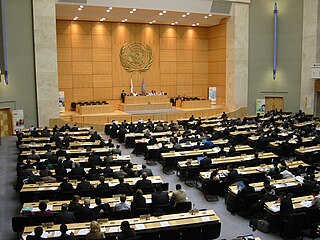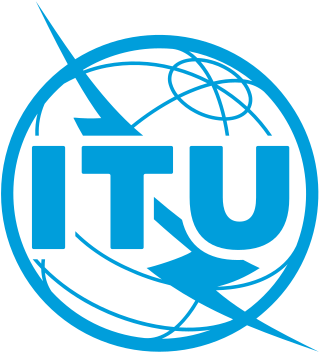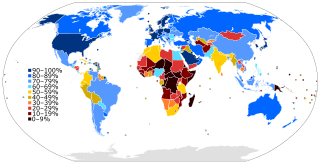Related Research Articles
The International Telecommunication Union Telecommunication Standardization Sector (ITU-T) is one of the three Sectors (branches) of the International Telecommunication Union (ITU). It is responsible for coordinating standards for telecommunications and Information Communication Technology, such as X.509 for cybersecurity, Y.3172 and Y.3173 for machine learning, and H.264/MPEG-4 AVC for video compression, between its Member States, Private Sector Members, and Academia Members.

The International Telecommunication Union (ITU) is a specialized agency of the United Nations responsible for many matters related to information and communication technologies. It was established on 17 May 1865 as the International Telegraph Union, significantly predating the UN and making it the oldest UN agency. Doreen Bogdan-Martin is the Secretary-General of ITU, the first woman to serve as its head.
Nigeria is Africa's largest ICT market, accounting for 82% of the continent's telecoms subscribers and 29% of internet usage. Globally, Nigeria ranks 11th in the absolute number of internet users and 7th in the absolute number of mobile phones.

The World Summit on the Information Society (WSIS) was a two-phase United Nations-sponsored summit on information, communication and, in broad terms, the information society that took place in 2003 in Geneva and in 2005 in Tunis. WSIS Forums have taken place periodically since then. One of the Summit's chief aims is to bridge the global digital divide separating rich countries from poor countries by increasing internet accessibility in the developing world. The conferences established 17 May as World Information Society Day.
The global digital divide describes global disparities, primarily between developed and developing countries, in regards to access to computing and information resources such as the Internet and the opportunities derived from such access.

Information and communications technology (ICT) is an extensional term for information technology (IT) that stresses the role of unified communications and the integration of telecommunications and computers, as well as necessary enterprise software, middleware, storage and audiovisual, that enable users to access, store, transmit, understand and manipulate information.

The Telecommunications Industry Association (TIA) is accredited by the American National Standards Institute (ANSI) to develop voluntary, consensus-based industry standards for a wide variety of information and communication technology (ICT) products, and currently represents nearly 400 companies. TIA's Standards and Technology Department operates twelve engineering committees, which develop guidelines for private radio equipment, cellular towers, data terminals, satellites, telephone terminal equipment, accessibility, VoIP devices, structured cabling, data centers, mobile device communications, multimedia multicast, vehicular telematics, healthcare ICT, machine to machine communications, and smart utility networks.

World Telecommunication and Information Society Day is an international day proclaimed in November 2006 by the International Telecommunication Union Plenipotentiary Conference in Antalya, Turkey, to be celebrated annually on 17 May.

The Internet in Africa is limited by a lower penetration rate when compared to the rest of the world. Measurable parameters such as the number of ISP subscriptions, overall number of hosts, IXP-traffic, and overall available bandwidth are indicators that Africa is far behind the "digital divide.". Moreover, Africa itself exhibits an inner digital divide, with most Internet activity and infrastructure concentrated in South Africa, Morocco, and Egypt, as well as smaller economies like Mauritius and the Seychelles. In general, only 43% of the African population has access to the Internet as of 2021. Only 0.4% of the African population has a fixed-broadband subscription. The majority of internet users use it through mobile broadband.
The Global Standards Collaboration (GSC) started life as The Inter-regional Telecommunications Standards conference (ITSC) in 1990. This was an initiative of the T1 Committee of the United States who invited the other founding partner organizations ITU-T, ETSI and the Japanese TTC to the first ISC Meeting in Fredericksburg, VA. The goal was set by the “spirit of Melbourne”, stemming from a CCITT Plenary Assembly, to find a way of co-operation between Participating Standards Organizations (PSOs) from different regions of the world in order to facilitate global standardization within the ITU. The ITSC focussed its work on fixed telecommunications networks.
The Indian Telecommunication Service, widely known as ITS, and earlier known as Telegraph Engineering Service Class I is one of the Central Civil Services under Group 'A' of the executive branch of the Government of India. The appointment to this service is done through Combined Engineering Services Exam held every year by Union Public Service Commission (UPSC) of India. The service was created to meet the techno managerial needs of the government in areas related to telecommunications. The Department of Telecommunications (DoT) had been managed for years by the officers of this permanent cadre, called the Indian Telecommunications Service (ITS). The officers of ITS work under restrictions and rules of Central Civil Services (Conduct) rules.
The Communications Authority of Kenya (CA) is the independent regulatory agency for the ICT industry in Kenya with responsibilities in telecommunications, e-commerce, broadcasting,cyber security, and postal/courier services. The CA is also responsible for managing the country's numbering and frequency spectrum resources, administering the Universal Service Fund (USF) as well as safeguarding the interests of users of ICT services.
Global Internet usage is the number of people who use the Internet worldwide.
Mobiles for development (M4D), a more specific iteration of Information and Communication Technologies for Development (ICT4D), refers to the use of mobile technologies in global development strategies. Focusing on the fields of international and socioeconomic development and human rights, M4D relies on the theory that increased access to mobile devices acts as an integral cornerstone in the promotion of overall societal development.
Chairman, MTN Nigeria Communications Plc

Houlin Zhao is a Chinese engineer who served as the Secretary-General of the International Telecommunication Union (ITU) from 2015 to 2022. He was first elected at the 2014 Plenipotentiary Conference in Busan, and re-elected at the 2018 Plenipotentiary Conference in Dubai. ITU is the specialized United Nations Agency for Information and Communication Technology (ICT), working on promotion, collaboration, and standardization.
The Bangladesh Computer Council (BCC) is a statutory government organization operating under the Information and Communication Technology Division of the Ministry of Posts, Telecommunications, and Information Technology of the government of Bangladesh. Its headquarters are situated in Agargaon, Dhaka, Bangladesh. It was initially known as the National Computer Committee (NCC) in 1983 and transformed into the Bangladesh Computer Council through Act No. 9 of the National Parliament in 1990.
The Women's Technology Empowerment Centre (W.TEC) is a non-profit organization that provides technology education for women and girls in Nigeria. W.TEC offers services and programs including mentoring, training, technology camps, awareness campaigns, collaborative projects, and research and publication in order to empower women.

Amr Ahmed Samih Talaat is an Egyptian engineer, academic, and government official serving as the Minister of Communications and Information Technology of Egypt since June 14, 2018. Before his appointment as minister, he had a long career in the private sector, including a tenure at IBM Egypt where he served as Country General Manager. Talaat holds degrees in engineering and business administration and has also been active in academia as an adjunct professor at Cairo University. In his role as minister, he has been instrumental in advancing Egypt's digital infrastructure and implementing the country’s digital transformation strategy.

ICT University is an accredited private university located in Yaounde, Cameroon. It aims to provide ICT and Managerial Human Capacity Development in developing countries.
References
- ↑ "Our History". Digital Bridge Institute. Retrieved 2024-09-12.
- ↑ "Digital Bridge Institute | ITU Academy". academy.itu.int. Retrieved 2024-09-12.
- ↑ John, Moses (2021-10-05). "DBI partners NLC on training of labour leaders". Blueprint Newspapers Limited. Retrieved 2024-09-12.
- ↑ Covenant (2023-08-15). "ADEPTI Training: Covenant University Management Advises Staff to Maximize the Training Opportunity". Covenant University. Retrieved 2024-09-12.